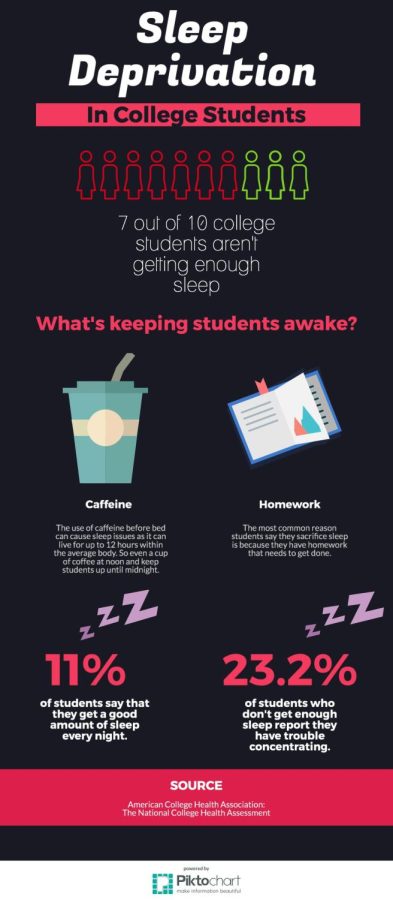Tired of losing sleep: Sleep deprivation takes a toll on students’ mental health
As the semester grows shorter, students’ to-do lists grow longer. Some students can feel overwhelmed by the sheer quantity of responsibilities ahead of them: classes, homework, projects, extracurriculars, all while juggling a constantly-evolving social life.
With only 24 hours in a day, students are likely to feel crunched for time to catch some Zs.
Sleep Deprivation from KentWired.com on Vimeo. Video by Julia Hazel.
“Sleep deprivation is actually at the point of a public epidemic,” said Harneet Walia, a doctor that works in the Cleveland Clinic’s Sleep Disorders Center. “The (Center for Disease Control) shows that one-third of individuals are sleep-deprived, which means that they are obtaining less than seven hours of sleep on a daily basis.”
According to the National College Health Assessment survey conducted at Kent State in 2014, many students on campus feel dragged down by a lack of sleep. Of the students who responded, 76.7 percent indicated they only get enough sleep during four or fewer nights a week. A total of 43.9 percent of students also reported problems with daytime activities due to their drowsiness, as well as another 47.9 percent who reported feeling tired during at least four days of the week.
“(Sleep deprivation) is pretty significant,” said Holly Allison, a nurse practitioner at the Kent State Deweese Health Center. “We see a lot of sleep issues, but they’re usually tied into patients who have an underlying psychological disorder like anxiety or depression, and that’s very prevalent.”
Walia said there are many ways that a lack of sleep can affect students, some of which can become an issue in the classroom.
“Sleep deprivation is reported to be linked with worse quality of life … and has negative effects on cognitive performance,” she said. “So this can of course have negative consequences on a person’s ability to perform their jobs (or studies).”
Unfortunately for students, this situation creates a bit of a paradox. Sleep deprivation can lead to decreased classroom performance and concentration skills, but stress from assignments and other school functions can lead to a lack of sleep.
“I personally have not been very good with getting work done quickly,” said Kristen Ernst, a sophomore communication studies major. “It’s not because I’m a bad student or anything. I just struggle with that. It’s part of my attention deficit hyperactivity disorder … In college, projects and assignments are bigger … It affects my sleep because I typically work best at night and assignments take me longer, so sometimes I end up having to pull all-nighters.”
Jennifer Roth, a senior nursing major, feels like the intensity of her major coursework has taken a toll on her ability to get a good night’s rest.
“We have to do a lot of papers, exams and all that stuff,” she said. “So all the homework, on top of working and being in clubs — there’s times when I’ll get like five hours of sleep for a few weeks.”
One of the main ways college students get through their day is by consuming caffeine, a psychoactive drug typically associated with increased alertness.
“I drink a Doubleshot from Starbucks almost every morning,” said Ernst, who added that her “good nights” of six hours of sleep are often cancelled out by all-nighters.
FDA studies suggest that moderate amounts of caffeine are not harmful. One hundred to 200 milligrams, or one to two five-ounce cups of coffee, each day is the limit that most doctors suggest, but each person is a little different.
FDA experts agree that 600 milligrams of caffeine, which is about four to seven cups of coffee or more each day, is too much. Caffeine overdoses do exist and can kill: In 2006, a 19-year-old college student named James Stone died after he took nearly two dozen NoDoz tablets, which each have about 200 mg of caffeine – about twice that found in a cup of coffee.
Walia warns against the use of caffeine as a substitute to a full night’s sleep. She said caffeine affects the neurotransmitters in a person’s brain and can contribute to sleep deprivation especially if that person consumes it late in the afternoon or evening.
Naps can be another potent and commonly used weapon in a college student’s arsenal against sleep deprivation, but as Allison warns, they must be used effectively.
“I generally don’t recommend (napping), but if you’re going to nap, you don’t want to do it in the evening or the late afternoon,” she said. “You should keep it to a (maximum) of less than 30 minutes. They recommend 20 minutes for napping. If you sleep longer than 40 minutes, you usually have that mental fogginess when you wake up and you have a jetlagged feeling.”
According to the National Sleep Foundation, napping for too long can leave someone with “sleep inertia,” defined as “the feeling of grogginess and disorientation that can come from awakening from a deep sleep,” or between sleep cycles. Even though these periods of sleep inertia usually only last for about a half hour, it can be detrimental to a student trying to catch some quick shut-eye before a class.
Sleep deprivation is become a serious issue for college students with too much on their plates, but caffeine and naps aside, there is only one true way for students to get their sleep.
“I don’t think those are substitutes for sleep,” said Walia. “Sleep is the only substitute for sleep.”
Editor’s note: This story is part of a student media project entitled “The Silent Struggle.” See the whole project here.
Cameron Hoover is a general assignment reporter. Contact him at [email protected].



